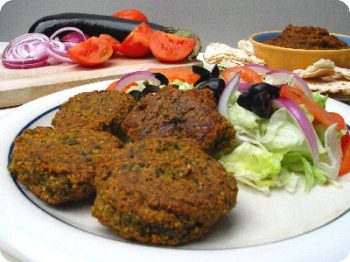Pronouns in Arabic Posted by aziza on Mar 3, 2009
Subject pronouns (ضمائر الفاعل) in Arabic are used to substitute nouns and to refer to them, e.g. (الطالب متغيب، هو مريض) “the student is absent; he is ill”. Personal pronouns in Arabic have a lot in common with English pronouns, but have some differences as well. For example, Arabic does not have a pronoun for…
Buying Food in Arabic Posted by aziza on Mar 3, 2009
If you want to buy food in an Arab country using the Arabic language, you need to use one of the colloquial dialects because it would be very odd to use Modern Standard Arabic in this context, since it is too formal and sellers may not even be able to understand. In this posting, I…
Felafel Posted by aziza on Mar 1, 2009
Felafel (الفلافل) is a traditional dish or even snack in Egypt and other parts of the Middle East. It has been largely internationalized in the last few decades. The traditional Egyptian felafel is made up of soaked broad (fava) beans mixed with various spices, onion, and garlic, in addition to parsley or coriander. It is…
Word formation and the use of Arabic dictionaries Posted by aziza on Feb 27, 2009
Most Arabic words are formed based on a root and certain patterns. The root typically consists of 3 letters, e.g. (ك ت ب). These letters can be used in a number of formations or patterns to make derivations or words that are related in meaning to the root, e.g. (كاتب)“writer”, (كتابة) “writing”, (كتاب) “book”, (مكتبة)…
Early Islamic history – the Rightly-Guided Caliphs Posted by aziza on Feb 26, 2009
Arab history is often identified with the history of Islam. Before Islam, Arabs lived as nomads in the deserts of the Arabian Peninsula. They lived as tribes where water sources were found, and they often worked in trade with other tribes and nations of Yemen and the Levant. At times, stronger tribes raided and acquired…
Calendars used in Arab countries Posted by aziza on Feb 23, 2009
In the Arab world, there are different calendars in use. The most common one is the Western calendar which is used in most countries of the world. The names of the months are different from one region to another. The following table gives 3 common ways of naming the twelve months of the year in…
Colloquial dialects in Arabic – Some features of Egyptian Colloquial Arabic Posted by aziza on Feb 17, 2009
Like most languages of the world, Arabic has many varieties. The most basic distinctions between different varieties of Arabic are based on medium, i.e. written or spoken, and geographical location. There is one main modern written variety of Arabic, namely Modern Standard Arabic or (MSA). This variety is used in writing and in formal talk…



